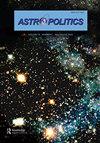Research Viewpoint: India’s Human Spaceflight Program: Underlying Rationales
Q3 Social Sciences
引用次数: 0
Abstract
ABSTRACT Indian Prime Minister Narendra Modi announced support for a human spaceflight program during his 2018 Independence Day speech. The target year of 2022 is when India plans to realize its first indigenous human space mission. Human spaceflight is a high risk activity and in many ways unaffordable for a developing country. Moreover, India professes that space technology is best utilized for aiding socioeconomic development and not as a tool in geopolitical competition and prestige. By assessing relevant developments, this paper argues that a variety of concerns and ambitions compelled India to consider a human space mission. The main actors are India’s political and scientific leaders who found support for such a mission in response to China and international prestige factors. Indian political leaders also saw an opportunity for improving their domestic political image. Further, the Indian Space Research Organization views human space missions as providing a new raison d’etre to the organization and helping it retain a skilled workforce amidst industrialization of satellite and launch vehicle development.研究观点:印度的载人航天计划:基本原理
印度总理纳伦德拉·莫迪在2018年独立日演讲中宣布支持载人航天计划。印度计划在2022年实现其首次自主载人航天任务。载人航天是一项高风险活动,在许多方面对发展中国家来说是负担不起的。此外,印度声称空间技术最好用于帮助社会经济发展,而不是作为地缘政治竞争和声望的工具。通过评估相关发展,本文认为,各种担忧和雄心迫使印度考虑载人航天任务。主要参与者是印度的政治和科学领袖,他们支持这项任务,以应对中国和国际声望因素。印度政治领导人也看到了改善其国内政治形象的机会。此外,印度空间研究组织认为,载人航天任务为该组织提供了新的存在理由,并帮助它在卫星和运载火箭开发工业化的背景下留住了熟练的劳动力。
本文章由计算机程序翻译,如有差异,请以英文原文为准。
求助全文
约1分钟内获得全文
求助全文
来源期刊

Astropolitics
Social Sciences-Political Science and International Relations
CiteScore
1.20
自引率
0.00%
发文量
2
期刊介绍:
Astropolitics: The International Journal of Space Politics and Policy is a peer-reviewed academic journal. The journal is dedicated to policy relevant and interdisciplinary analysis of civil, commercial, military, and intelligence space activities. Committed to the highest editorial standards, Astropolitics is the international journal of choice for the academic, policy-maker and professional in the space community.
 求助内容:
求助内容: 应助结果提醒方式:
应助结果提醒方式:


